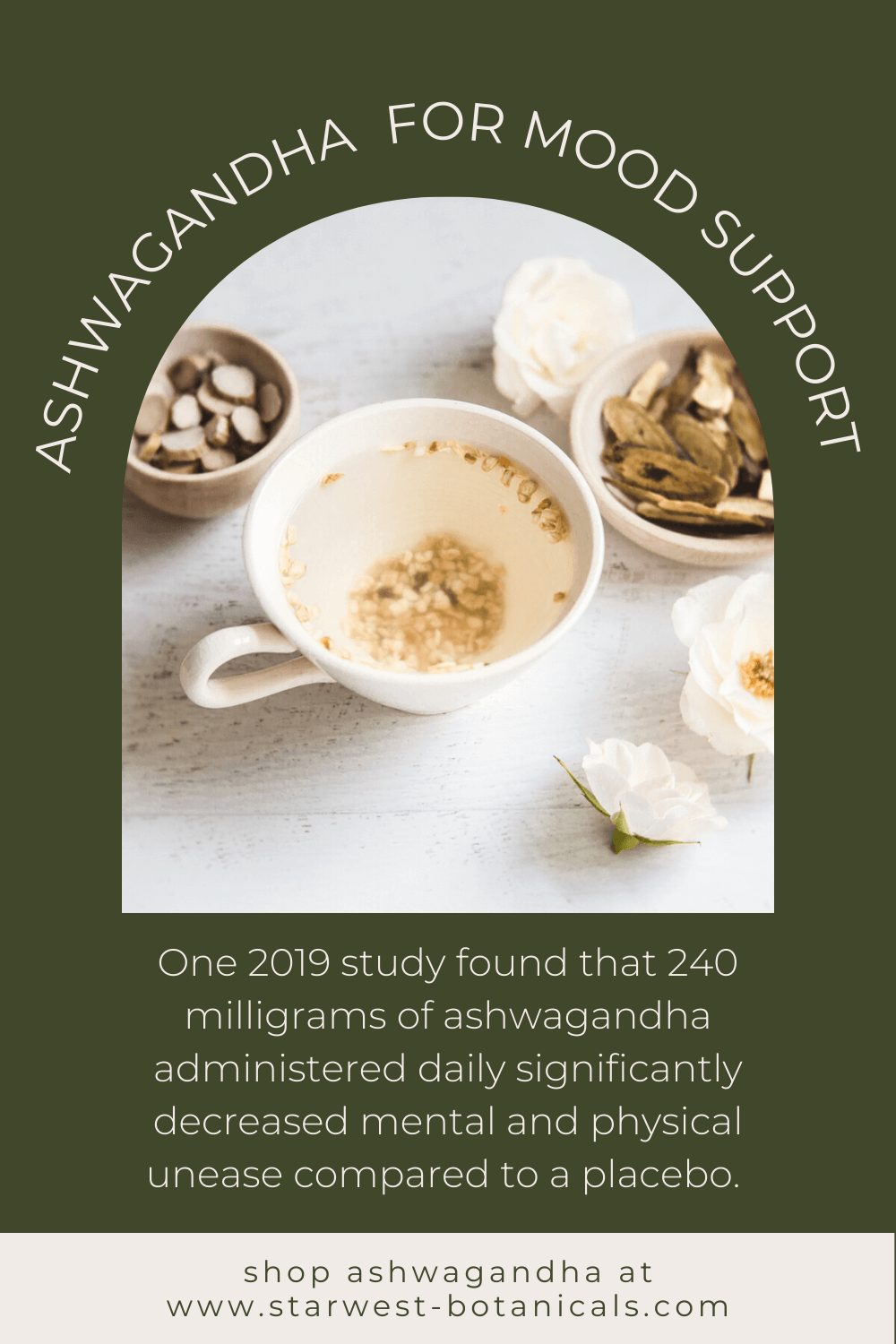Ashwagandha for Mood Support: A Guide | Starwest Botanicals
Posted by Starwest Botanicals Content Team | Medically Reviewed by Daniel Powers, MS on 07-22-2022

Ayurvedic medicine has long celebrated the stress-relieving impact of botanical ashwagandha, an evergreen shrub that grows in India, the Middle East, and regions of Africa.
Powdered ashwagandha is often combined with ghee, honey, or water to supplement tasty desserts, hot beverages, and smoothies.
Whether you’re confronting unexpected stressors, battling low moods, or looking for a plant-based pick-me-up, organic ashwagandha root may offer support.
In this guide, we’ll explore the plant’s potential healing properties and ways you can incorporate this herb into your wellness routine.
What is Ashwagandha?
Otherwise known as Indian ginseng or winter cherry, the ashwagandha shrub (Withania somnifera) is touted as a stress-reliever within traditional medicine. Its vermillion berries and aromatic roots are harvested across India, Africa, and the Middle East.
In Sanskrit, the name of this unassuming shrub translates to “the smell of a horse,” which refers to its distinct, earthen smell that’s reminiscent of equine sweat. And ashwagandha more than lives up to its likeness, boasting potential healing and health benefits that tout the strength of a stallion.
This botanical was fundamental to ancient herbalism in India.
Ashwagandha is also thought to work as an adaptogen, which means that it may help your body to adapt to new stressors.
Ashwagandha for Mood Support
With qualities that can soothe your body as well as your mind, this supplement takes a holistic approach to stress support. And there are many other ashwagandha benefits for men and women to consider.
This shrub has only recently entered the global limelight, and while information about its impact is still being accrued, various studies suggest that once you have learned how to use ashwagandha powder properly, it can provide a calming effect:
- Stress study – One 2019 study found that 240 milligrams of ashwagandha administered daily caused test takers to report significantly decreased mental and physical unease compared to a placebo. This suggests that ashwagandha has a noticeable impact on stress levels when taken regularly.
- Cortisol study – Another successful 2019 study illustrated that 250-600 milligrams of ashwagandha a day drastically decreased participants’ cortisol levels. Cortisol is a stress hormone produced in our adrenal gland that works to regulate everything from blood sugar levels to stress responses.
As part of your endocrine system, cortisol release impacts almost every organ. While your body works to maintain homeostasis, or its ideal internal state, high levels of cortisol can cause disturbances and physical stress.
Ashwagandha may naturally slow this chemical’s production, making it a great natural herb for stress.
Dosage and Forms of Ashwagandha
Ashwagandha typically comes in three forms, each tailored to your specific needs. We’ll explore each method to help you familiarize yourself with the various applications of this potentially beneficial botanical:
- Capsules – Ashwagandha powder is packed tight into small, swallowable capsules. At Starwest our ashwagandha root capsules are vegetarian, formulated with carrageenan that provides a tasteless smooth exterior. Clinical research has yet to determine an “ideal” dose for daily capsule intake, with milligrams ranging from 200 to 1500 per unit. Fortunately, most capsules fall perfectly in the middle, at 425 milligrams each. We recommend you take two a day alongside a meal.
- Tincture – Distilled liquid tinctures are known to preserve medicinal properties longer than any other form. Our USDA Organic ashwagandha root extract is cold-processed to extract maximum benefits and can last up to 5 years when properly stored in a cool, dark environment. We recommend that you mix an ashwagandha dosage of 10-20 droplets into your water or juice several times a day as needed.
- Powder – While we encourage the ashwagandha beginner to rely on pre-formulated capsules or tincture, we also package powdered ashwagandha root from our organic suppliers by the pound. Home herbalists and apothecaries are encouraged to bulk buy this high-quality ingredient for their specialized concoctions, whether you’re crafting a mid-afternoon smoothie or brewing a few cups of bedtime tea.

Side Effects of Ashwagandha
Like any herbal supplement, ashwagandha is not recommended for pregnant women. A moderate ashwagandha dosage may be comfortably tolerated, but a higher dosage reveals these possible side effects:
- Upset stomach
- Vomiting
- Diarrhea
Additionally, ashwagandha is not regulated by the FDA. As such, pay special attention to your ashwagandha supplement’s label and ensure you’re sourcing it from a reputable company.
How to Calm Your Mind and Body: Tips for Relaxation
As you are taking ashwagandha capsules or sipping on your herbal tea, you can help to support a balanced mind and body with relaxing breathing exercises to put you in a more restful state.
We’ve noted three of our favorites here—try these meditative breathing exercises when you start to feel your mind fog and your heart pump. They’re entirely soothing, whether you’re at home or on the go.4
#1 Box Breathing
Pace your breathing with this simple exercise. Even rhythm and repetition can calm your body in stressful moments:
- 1. Breathe out while counting to 4
- 2. Keep your lungs empty for another 4 beats
- 3. Breathe in deeply for 4 counts
- 4. Hold your breath for another 4 counts
- 5. Repeat as many times as needed
#2 Alternate-Nostril Breathing
Known in Sanskrit as Nadi Shodhana Pranayama, this ancient breathing technique is beloved by yogis worldwide. Take a moment and restore balance:
- 1. Hold up your hand and bend down your pointed and middle finger. This leaves your thumb, ring finger, and pinky ready to work.
- 2. Block your right nostril with your thumb and breathe in and out through your left nostril.
- 3. Release your right nostril and block your left nostril with your ring finger, breathing in and out of your right nostril.
- 4. Block your right nostril with your thumb and breathe in and out through your left nostril.
- 5. Repeat up to 10 times.
#3 Belly Breathing
Belly breathing involves filling your abdomen with large amounts of air to promote relaxation. Simply fill your lungs with air and then release for palpable tension relief. Abdominal breathing exercises excellently complement your ashwaganda’s potential and are simple to do:
- 1. Rest a hand on your upper chest and a hand on your belly.
- 2. Take a slow deep breath through your nose and feel your stomach expand.
- 3. Exhale and repeat.
Release the Stress with Starwest
Taking ashwagandha root daily may help to ease morning-time jitters and relieve everyday feelings of nervousness or unease.
For an ashwagandha supplement you can trust, look to Starwest. We formulate each of our products with the highest quality herbal ingredients. And our organic ashwagandha capsules, tinctures, and powders can help put your mind and body into a more tranquil state.
But, our ashwagandha products are only one piece of our peace puzzle—from soothing chamomile tea to restorative essential oils, we craft holistic wellness supplements that ease you into blissful relaxation.
Take a deep breath with Starwest Botanicals.
Sources:
Journal of Alternative and Complementary Medicine. A Systematic Review of Human Trial Results Reported for the Ayurvedic Herb Ashwagandha. https://www.ncbi.nlm.nih.gov/pmc/articles/PMC4270108/


